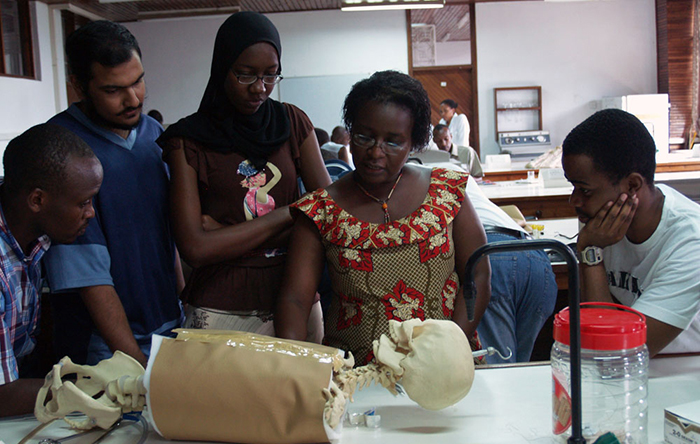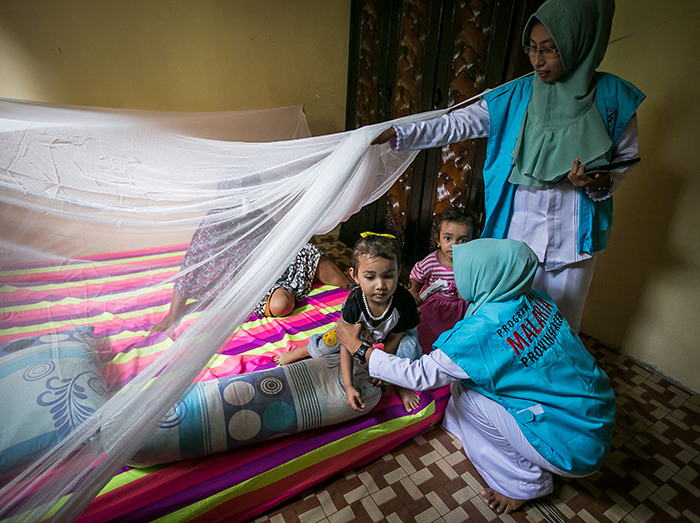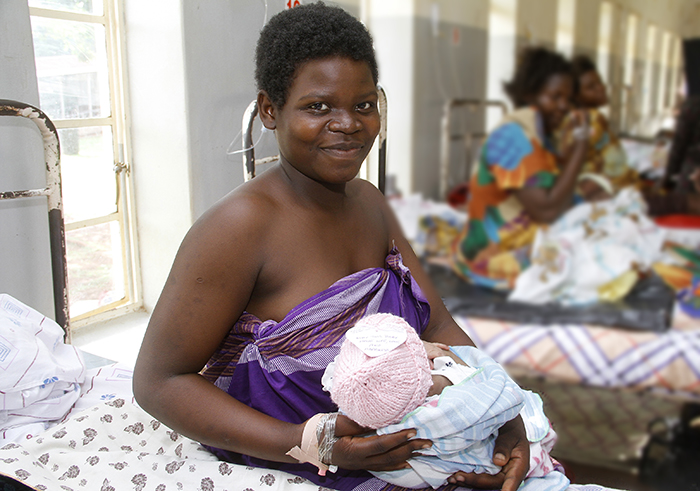The Beginnings of Global Health at UCSF
The Institute for Global Health Sciences (IGHS) started as the Institute for Global Health (IGH), established in 1999 when then UCSF Dean of Medicine Haile T. Debas, MD, and Dean of the UC Berkeley School of Public Health, Edward Penhoet, PhD, agreed to establish a joint Institute. While UCSF had addressed global health issues for decades, its commitment to global health as a research area and academic discipline began with IGH.
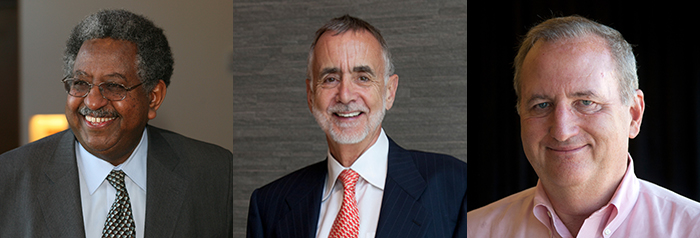
Sir Richard Feachem, DSc (Med), PhD, former dean of the London School of Hygiene and Tropical Medicine and, at the time, the director of Health, Nutrition and Population at the World Bank, was recruited as the founding director of IGH with joint appointments at UC Berkeley and UCSF. IGH was physically located at UCSF and eventually was fully supported as a UCSF institute. It was the first academic entity anywhere in the nation to have the term “global health” in its title.
Under Feachem’s leadership, IGH focused on conducting research, developing and evaluating policy, and providing high-level training. It also worked to forge consensus among leading scientists and policymakers to influence policy and stimulate action by governments, corporations and international agencies to improve health and increase access to health services worldwide. The annual Global Health Fora hosted by IGH brought together leaders from the public and private sectors to forge policy consensus and agree on actions to address some of the most pressing global health issues of the day.
In 2002, Feachem took a leave of absence from UCSF to become the founding executive director of the Global Fund to Fight AIDS, Tuberculosis, and Malaria. George Rutherford, MD, replaced him as IGH director. Under Rutherford’s leadership, IGH became an Organized Research Unit, an academic unit designed to facilitate interdisciplinary research. During this period, Rutherford secured the first PEPFAR/CDC grants to address the HIV/AIDS crisis in Africa, Asia and Latin America. That work continues to this day as a significant activity within IGHS, with projects around the world.
Unifying UCSF’s Global Work
In 2003, UCSF solidified its commitment to global health by establishing Global Health Sciences (GHS), a pioneering program dedicated to improving health and reducing the burden of disease through education, research and service. Former UCSF Chancellor Debas was appointed founding executive director, reporting directly to the UCSF Chancellor and serving on the Chancellor’s cabinet.
Debas chose the name Global Health Sciences to indicate the program’s commitment to rigorous research to produce evidence for policy-making and clinical practice. The basic and clinical sciences departments, preeminent in their respective fields, were to play a significant role. It became the umbrella organization for all global health-related programs at UCSF, including the Institute for Global Health, and served all four UCSF schools—Medicine, Dentistry, Nursing and Pharmacy—and the Graduate Division.
Training the Next Generation of Global Health Leaders
Education and training at UCSF and globally were a special focus of GHS during Debas’ tenure. Between 2005 and 2009, GHS collaborated with others to develop several education and training programs, including:
- Partnerships with Muhimbili University of Health and Allied Sciences (MUHAS) in Tanzania to enable each institution to share its expertise in education, research and clinical care; with Aga Khan University that included a project to develop models of primary health care delivery across East Africa and Asia to reduce maternal, newborn and child mortality; and with King’s College London to promote global surgery initiatives and develop a global health graduate curriculum
- Programs to train UCSF students and scholars in global health research (Global Health Clinical Scholars), to provide medical students with a deep dive into global health (Pathways to Discovery in Global Health) and to introduce essential skills for responding to humanitarian emergencies (Complex Humanitarian Emergency Training)
- The nation’s first master’s program in Global Health Sciences, developed by John Ziegler, MD, MSc, an intense 11-month program that explores critical global health challenges and develops solutions through focused training, mentorship by world-renowned faculty, and a capstone research project. The inaugural class of 10 students began in the fall of 2008. Today, Christopher Carpenter, MD, MPH, directs the program, and more than 300 graduates work in all areas of global health worldwide.
GHS, under Debas’ leadership, catalyzed other global health organizations, including the system-wide UC Global Health Institute and the Consortium of Universities for Global Health, which has developed into the leading forum for academic global health.
In 2010, Debas stepped down, and Feachem, who had returned to UCSF in 2007, led GHS on an interim basis until the appointment of Jaime Sepulveda, MD, MPH, MSc, DrSc, in 2011.
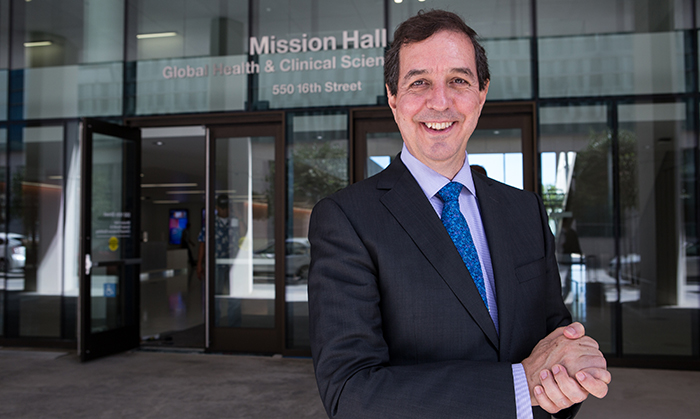
Growing Together in Mission Bay
Among Sepulveda’s early significant contributions was finding a single home more integrated with the UCSF campus for the growing program. He secured a $20 million gift from philanthropist Chuck Feeney, enabling the University to double the size of the planned building on the Mission Bay campus. The Mission Hall: Global Health and Clinical Sciences building now serves as home to more than 300 IGHS faculty, staff and students. In it, IGHS has grown into a cohesive, transdisciplinary organization of more than 300 faculty and staff.
Sepulveda also expanded the Institute’s research portfolio, adding several leading global health experts to GHS, including:
- Paul Volberding, MD, HIV/AIDS researcher and director of UCSF’s AIDS Research Institute (ARI), joined the Institute as director of research, bringing the ARI into the fold.
- Eric Goosby, MD, former UN Special Envoy on Tuberculosis and Ambassador-at-large and US Global AIDS coordinator under President Barack Obama, has developed global health delivery and diplomacy programs, particularly related to tuberculosis.
- Dilys Walker, MD, a leading researcher and clinician in Obstetrics and Gynecology, specializes in improving facility-based care of mothers and babies during labor, delivery and immediate postpartum.
- Dean Jamison, PhD, a global health economist, has led several significant projects, including the Lancet Commission on Investing in Health and the Disease Control Priorities series.
- Colin Boyle, MBA, MPP, joined IGHS as its first deputy director after 15 years as a partner and managing director of the Boston Consulting Group, where he led many of the firm’s social impact projects, helping industry and non-profit innovators develop new products to combat disease and bring them to market for health impact.
Sepulveda has focused his research on non-communicable diseases and health policy, particularly in Latin America. He serves as co-chair of the UC-Mexico Health Working Group, an initiative of former University of California President Janet Napolitano.
With an expanded faculty, sponsored research grew from less than $30 million annually to more than $80 million annually.
In 2016, IGHS launched a PhD program in global health under the direction of Lisa Thompson, RN, PhD, FNP, and established global programs offices to provide operational and financial management support to UCSF researchers working in-country. Sepulveda was crucial in initiating collaboration with UC Berkeley, UC Davis, and Stanford, which helped launch the Bay Area Global Health Alliance.
New Vision and Leadership for IGHS
In 2017, GHS underwent a significant transformation, evolving into the Institute for Global Health Sciences (IGHS). This change reflected a deepening and expansion of UCSF’s commitment to addressing global health challenges through interdisciplinary and collaborative research, education and capacity-building. By harnessing UCSF’s vast global health expertise, IGHS sought to increase its impact on health needs worldwide.
When the COVID-19 pandemic emerged in 2020, IGHS quickly pivoted to address this global crisis. Using their experience from previous pandemics, including HIV/AIDS, IGHS researchers led the way in developing guidelines for managing and preventing the spread of the virus, especially in low-resource settings, and the understanding of the virus’s epidemiology and vaccine efficacy, which influenced global policies and health strategies.
In 2024, IGHS welcomed Payam Nahid, MD, MPH, as its new executive director. Nahid has over two decades of experience in global health research, specializing in clinical trials and translational research focused on TB and HIV/TB co-infection. He is the director of the UCSF Center for Tuberculosis and has led international programs funded by the NIH, CDC, USAID, and BMGF. Nahid’s appointment marks a new chapter of leadership and vision for the Institute. His priorities are solidifying IGHS as the home for global health at UCSF, expanding global partnerships that are equitable and inclusive, and supporting UCSF research that informs international health policies and guidelines.

Timeline
Driven by Haile Debas, MD, UCSF’s School of Medicine and UC Berkeley’s School of Public Health jointly launch the Institute for Global Health, the first academic global health center in the nation. They recruit Richard Feachem, KBE, PhD, DSc, from the World Bank to lead it.
World Health Organization (WHO) declares HIV to be the fourth leading killer in the world and the largest in Africa.
UN Member countries approve the Millennium Development Goals, which establish targets for reducing HIV/AIDS, malaria, and tuberculosis and maternal and child mortality.
The Bill & Melinda Gates Foundation is formed, setting global health as one of its top priorities.
UCSF Chancellor Bishop provides start-up funding for Debas’ vision for a Global Health Sciences (GHS) program at UCSF, harnessing the University’s scientific capabilities to reduce health inequities worldwide.
Then-president George W. Bush launches PEPFAR, the President’s Emergency Plan for AIDS Relief, a $15-billion initiative to address HIV/AIDS in poor countries. Rutherford secures the first PEPFAR grants for UCSF.
GHS hires its first faculty member: Sarah Macfarlane, PhD, MS. Today, more than 300 faculty members are affiliated with IGHS.
GHS launches a teaching exchange and broader collaboration with Muhimbili University of Health and Allied Sciences (MUHAS) in Tanzania, which will help revitalize post-colonial science curricula.
Family AIDS Care and Education Services (FACES) program launches in Western Kenya under the leadership of Craig Cohen, MD, MPH. This ongoing program is the first of several UCSF collaborations with the Kenya Medical Research Institute (KEMRI) to expand capacity and medical expertise in Kenya.
Global Health Sciences officially launches.
Debas writes the guidelines for surgery in the World Bank-funded Disease Control Priorities in Developing Countries (DCP2), putting surgery on the map of global health.
Institute for Global Orthopaedics and Traumatology (IGOT) founded to improve care for underserved peoples and regions through collaborations.
Clinical Scholars Program launched to train UCSF residents and scholars in global health research.
Feachem returns to UCSF from the Global Fund and launches the Global Health Group, an “action tank”, with funding from the Gates Foundation.
Malaria reduction is re-envisioned as malaria elimination based on evidence produced by UCSF, and the Malaria Elimination Initiative is launched.
The Consortium of Universities for Global Health (CUGH) is formed out of a meeting hosted by Jaime Sepulveda, MD, DSc, MPH, then at the Gates Foundation. UCSF hosts CUGH until it becomes independent in 2011.
The School of Medicine’s Pathways to Discovery in Global Health becomes one of UCSF’s areas of focused learning.
GHS offers the first Master of Science in global health in the nation, and taps John Ziegler, MD, to lead the program.
U.S. Congress reauthorizes PEPFAR for an additional 5 years; the legislation also ends the statutory HIV travel and immigration ban.
Debas launches UC Global Health Institute, a UC system-wide initiative to promote global health activities, education and research collaborations.
GHS forms a partnership with Aga Khan University, establishing a Department of Family and Community Medicine with a residency program and later helping the Karachi campus build a stem cell research facility.
U.S. President Obama launches the Global Health Initiative, which includes PEPFAR.
Debas steps down as GHS leader. Feachem steps in as interim leader.
GHS leads a Lancet series on malaria elimination.
Jaime Sepulveda is recruited from the Gates Foundation and takes the helm of GHS.
The School of Nursing creates a minor in global health.
The School of Dentistry establishes the Global Oral Health Program.
Molly Cooke, MD, joins as the first GHS director of education.
Paul Volberding, MD, joins as GHS director of research, and assumes leadership of the AIDS Research Institute (ARI), aligning GHS and ARI operations.
Chuck Feeney makes a transformational gift allowing GHS and related teams to be housed together on the Mission Bay campus in the planned Mission Hall.
WHO and partners call attention to rising rates of preterm births.
Eric Goosby, MD, joins GHS and pioneers the Center for Global Health Delivery and Diplomacy.
UNAIDS reports that, since 2005, death related to AIDS have declined by almost 30%.
Gates Foundation and philanthropist Marc Benioff jointly fund $50M UCSF Preterm Birth Initiative to address causes of prematurity in California and East Africa.
Bay Area global health speaker series is launched in collaboration with UC Berkeley, UC Davis and Stanford. The series brings together academic experts from the four schools and will evolve into the Bay Area Global Health Alliance.
UCSF clinicians and researchers help address the Ebola epidemic in West Africa.
GHS relocates to Mission Hall.
Rutherford plays a central role in revising WHO HIV-treatment guidelines, recommending early treatment and the use of antiretrovirals as a tool for prevention.
Goosby becomes the UN Secretary General’s Special Envoy for Tuberculosis.
UC President Janet Napolitano launches UC-Mexico Initiative; Jaime Sepulveda co-chairs its health component.
Dilys Walker, MD, launches the East Africa Preterm Birth Initiative.
Malaria incidence rates are down by 37% and death rates by 60% from 2000.
UN Millennium Development Goals on halting HIV/AIDS epidemic are met ahead of schedule. The UN adopts Sustainable Development Goals, which retain significant health improvement targets.
PhD program in Global Health Sciences launches with its first class of students.
Walker creates Maternal, Newborn and Child Health Research Cooperative to support all UCSF global maternal health projects.
Global Health Sciences (GHS) becomes the Institute for Global Health Sciences (IGHS), a campus-wide program directly under the Chancellor.
With TB deaths down worldwide by a third since 2000, WHO calculates that 54 million lives have been saved.
As UN Special Envoy of TB, Goosby convenes a UN High-Level Meeting where world leaders endorse the most ambitious TB elimination commitments to date.
Bay Area Global Health Alliance is launched with UCSF as anchor organization.
IGHS grants its first PhDs in Global Health Sciences.
IGHS chairs Lancet commissions and releases reports on malaria eradication and building a TB-free world.
IGHS partners with the San Francisco Department of Public Health to investigate and trace COVID-19 infections.
IGHS forms the Diversity, Equity and Inclusion Committee to ensure equitable staffing and an inclusive workplace and research culture.
IGHS leads WHO committees on a case study of the U.S. and Mexico’s COVID responses.
The Center for Health Equity in Surgery and Anesthesia, formed to provide access to safe and affordable surgical and anesthesia care worldwide, joins IGHS.
IGHS launches Global REACH to help students from all backgrounds pursue careers in global health, beginning in high school.
IGHS launches a malaria toolkit for ministries of health and partners used in 17 countries.
IGHS invites leaders to discuss racial justice and efforts to disentangle global health from Western colonialism in an inaugural speaker series.
IGHS launches an effort to examine global health partnerships and address how inequities impact research and collaborators in low- and middle-income countries.
IGHS reorganizes into seven centers based on our wide array of expertise and research areas.
An IGHS co-chaired Lancet commission releases a report on how to turn the tide on tuberculosis.
With partners in East Africa, IGHS embarks on an initiative to bring together data science, artificial intelligence and technology to improve health.
The Center for Global Nursing, which brings together nurses, advanced practice providers, faculty, and students to explore global health solutions, launches at IGHS.
IGHS and African partners launch the Global Equitable Partnerships Initiative.
Payam Nahid, MD, MPH, joins IGHS as executive director.
